I’ve rearrived! There are numerous reasons for the delay. First and foremost is: man, that second paragraph is dense! Other than that, my family and I went on two small vacations and, in the meantime, I signed up for the Rosenbach Museum’s “Learn Ulysses Online” class. Yes, I’m also going to read Ulysses again and I can’t wait! I’ve also decided to dive into Richard Ellmann’s biography of James Joyce. So, needless to say, I’ve been pretty busy but it’s been all-Joyce-all-the-time. So where to begin? Let’s begin with the first part of the second paragraph:
Sir Tristram, violer d’amores, fr’over the short sea, had passencore rearrived from North Armorica on this side the scraggy isthmus of Europe Minor to wielderfight his penisolate war…
Finnegans Wake by James Joyce
Who is “Sir Tristram”? Well, he’s partially Tristan from the 12th century romance, Tristan and Iseult. Since I’ve heard there will be multiple references to Tristan and Iseult (both Iseults, mind you… I’ll explain), I figured it would make sense for me to actually read it rather than just borrow from the Wikipedia article. So I did. See my brief summary of The Romance of Tristan and Iseult at the end of this post. Additionally, there was a poem called Tristram and Iseult (notice the different spelling) written by Matthew Arnold in 1877. This was someone that Joyce certainly knew about if his biography is to be believed. I’ve included a few screenshots of the poem below.
But why is it just partially Tristan? Well, apparently it also refers to Sir Almeric Tristram, a Norman knight who conquered Howth (remember Howth Castle and Environs?) in 1177, according to Wikipedia. Almeric then, apparently changed his name to “Lawrence”, which is the same name we referred to in the last post.
So, violer d’amores… A viola is a musical instrument. Tristan was apparently a talented harp player. Amores is a misspelling of the French word amour for “love”. So, a musical lover? Or, as it’s written, is it a violator of love? Tristan violated his vow to Iseult of Ireland by marrying Iseult of Brittany. He also is violating the marriage of Iseult of Ireland with King Mark of Cornwall.
For the rest (“fr’over the short sea, had passencore rearrived from North Armorica on this side the scraggy isthmus of Europe Minor”), we turn again to a map:
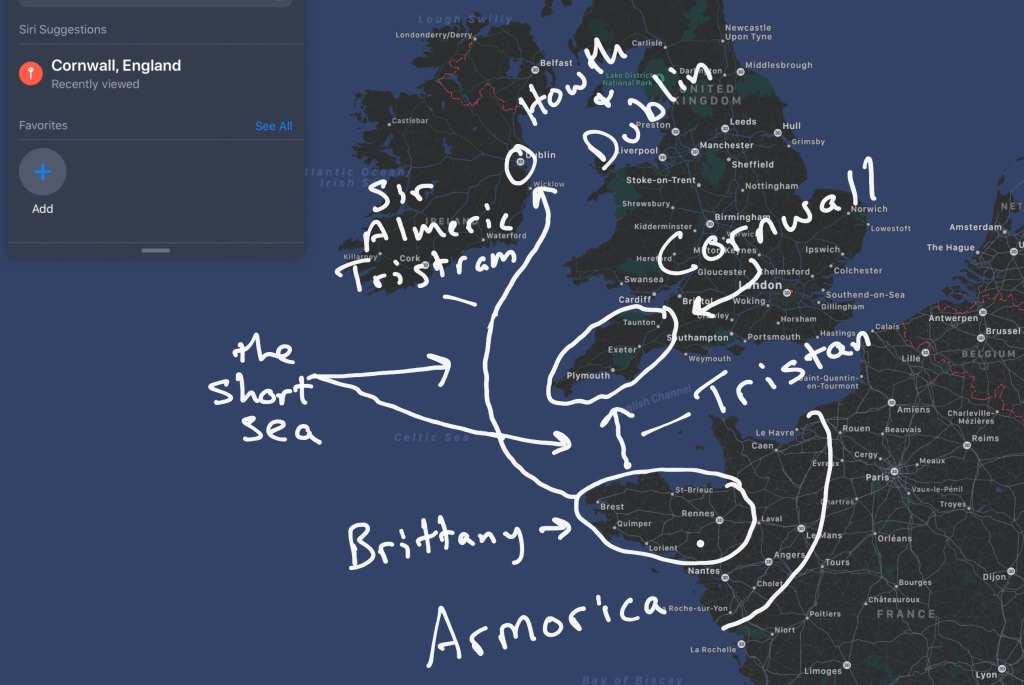
It looks like Joyce is trying to give us a time frame. The word “passencore” is a merging of the French words “pas encore” which means “not again”. So Tristan/Tristram had not again “rearrived” here (Ireland) from North Armorica. At first, I think most people assume that’s just a Joycean spelling of “North America” but, as it turns out Armorica was a place. According to the Encyclopedia Brittanica:
Armorica, also spelled Aremorica, (from Celtic ar, “on,” and mor, “sea”), Latin name for the northwestern extremity of Gaul, now Brittany. In Celtic, Roman, and Frankish times Armorica also included the western part of what later became Normandy. In Julius Caesar’s time it was the home of five principal tribes, the most important being the Veneti. Under the Roman Empire it formed part of the province of Gallia Lugdunensis. It received many immigrants from the British Isles in the 5th and 6th centuries, during the time of the Saxon invasion.
Encyclopedia Brittanica
So, North Armorica is, indeed, Brittany, France, both where Sir Almeric Tristram came from and where Tristan came from yet again (see synopsis below). And, sure, it doesn’t directly mean “North America” but, if Joyce didn’t intend some reference to North America, why use that name at all? Particularly since he actually does refer to North America later in this same sentence. So, it is all of the above at the same time.
Next up, we have “wielderfight his penisolate war“. The first thing I see is “fight his war of the penis” which could reference Tristan returning from Brittany to pursue, again, Iseult of Ireland. I also read a reference that said it could be “pen-isolate” which could either mean, a “war of the pen” or “isolated penis”, the latter suggesting masturbation. Which, in my mind, is even further evidenced by “wielderfight”. Is that “wield or fight” his “penis war”? Or is that “wield his penis” and/or “fight his war”? No idea.
What many seem to think is that it refers to the Peninsular War where Napoleon and the French fought the British, Spanish, and Portuguese. Possibly, but that wasn’t until the 1800s, which really screws with our timeline if we’ve already referenced an event that happened in 1177. But, then again, no one dares to think that Finnegans Wake follows a linear timeline. Maybe it’s both at the same time? Probably.
Anyway, that’s it for this post. I hope it wasn’t too incoherent. Next time, I’ll talk a little about Tom Sawyer’s genitals. (Seriously. You’ll see.)
Add-On: Summary of Tristan and Iseult
So, here’s the gist of the story… Keep in mind that this is an old tale so there may be multiple versions. This is the version I read.
Tristan’s father dies in war before Tristan is born. He is raised by King Mark of Cornwall, his uncle. Tristan gets abducted and is taken away on a ship. The ship crashes. Tristan survives and meets a pack of hunters. He teaches the hunters many things so they take him back to their king who is… King Mark! King Mark is impressed with the young man, particularly on his skill with a harp.
The King of Ireland sends a huge knight, Morholt, to Cornwall, to demand tribute that Mark’s predecessors have paid in the past. Tristan volunteers to fight Morholt on behalf of his new king. He wins but is terribly injured in the process. Not knowing what to do, they put Tristan in a boat with no oars and no sails, only his harp, and set him to sea figuring that it’s in God’s hands now. After seven days and seven nights, some fishermen hear the harp music and find him in the boat. They bring him in to Iseult the Fair, hereafter known as Iseult of Ireland.
He gets better, lies about who he is, and escapes back to Cornwall. Iseult, though, eventually figures out that this was Tristan, the man who killed Morholt. So she hates him.
At this point, people in Mark’s court are jealous of Tristan. So, given that the king does not have an heir, they’re worried that the king will give everything to Tristan. So a couple of evil dudes persuade the king to take a wife so that he might have an heir. The king thinks about this. While he’s thinking, two sparrows come to his window with a golden hair. He tells his court that he has decided on a wife. He wants to marry the woman whose hair just came in his window. Sounds better than Tinder, IMO.
Tristan knows that the hair belongs to Iseult of Ireland so he tells the king, he’ll go fetch her for him. He travels to Ireland. When he gets there, he comes upon a town that is being terrorized by a dragon. If he kills the dragon, the king promises his daughter to him. His daughter is… Iseult of Ireland!
Tristan goes and kills the dragon. He gets injured again. Iseult heals him again. Then she decides not to hate him. Much drama ensues where someone else tries to take credit for killing the dragon but Tristan prevails. Iseult’s mother, the queen of Ireland, is super happy that she’s going to marry King Mark. So she gives Iseult’s maiden a secret potion that will ensure that they love each other forever, as long as both of them drink it. But, she warns the maiden to keep it a secret! Surely you can see where this is going…
On the way back to Cornwall, Tristan and Iseult get thirsty. So, of course, they drink the potion. They fall in love.
When they get back to Cornwall, those four jerks are still plotting and they figure out that Tristan loves the queen. They try and try again to prove it to the king. Finally they do. The king sentences both Tristan and Iseult to death. Tristan escapes and the king gives Iseult to the lepers rather than kill her. Tristan defeats the lepers and manages to rescue Iseult. They go live in the woods together.
King Mark eventually finds them but decides not to kill them. Instead he leaves his gloves to show them that he knows about them and where they are. They realize that they’ve been spared by the king. Now they feel bad. Tristan and Iseult decide to give themselves up to the king. Tristan returns Iseult to the king and then he leaves Cornwall.
Tristan ends up in Brittany. He meets a local Duke, fights bravely for him and the Duke promises that Tristan can have his daughter. Also named Iseult. But this one is Iseult of the White Hands, hereafter known as Iseult of Brittany. Tristan marries her but doesn’t sleep with her, saying something about a vow. He feels bad because he feels like he betrayed the first Iseult, Iseult of Ireland.
He manages to go back to Cornwall to visit Iseult of Ireland, and disguises himself as a madman. Iseult eventually believes that it’s him.
He leaves again and goes back to Brittany. He’s injured. Again. He’s on the verge of death. So he sends his assistant back to Cornwall to bring back Iseult of Ireland, his original love, so that he may see her one more time before he dies. And he tells him, if he’s successful in bringing her back, come into the harbor with a white sail. If not, a black one. The problem is the second Iseult, Iseult of Brittany, his wife, overhears this and starts thinking about how best to get her revenge.
He gets worse and worse. Eventually, Iseult of Ireland comes back and Tristan’s assistant flies a white sail in the harbor. Iseult of Brittany sees this and goes to the ailing Tristan and tells him it’s a black sail. Tristan dies of grief. Iseult of Ireland lands on shore, goes to Tristan and sees that he died. So she, too, dies of grief.
So why include all of this? From what I’ve read so far, this myth comes up fairly often in Finnegans Wake, particularly the theme of two women fighting for the affection of a lover or father figure, or even corrupting the father figure. Also, Tristan rearrives from North Armorica in Ireland and Cornwall.
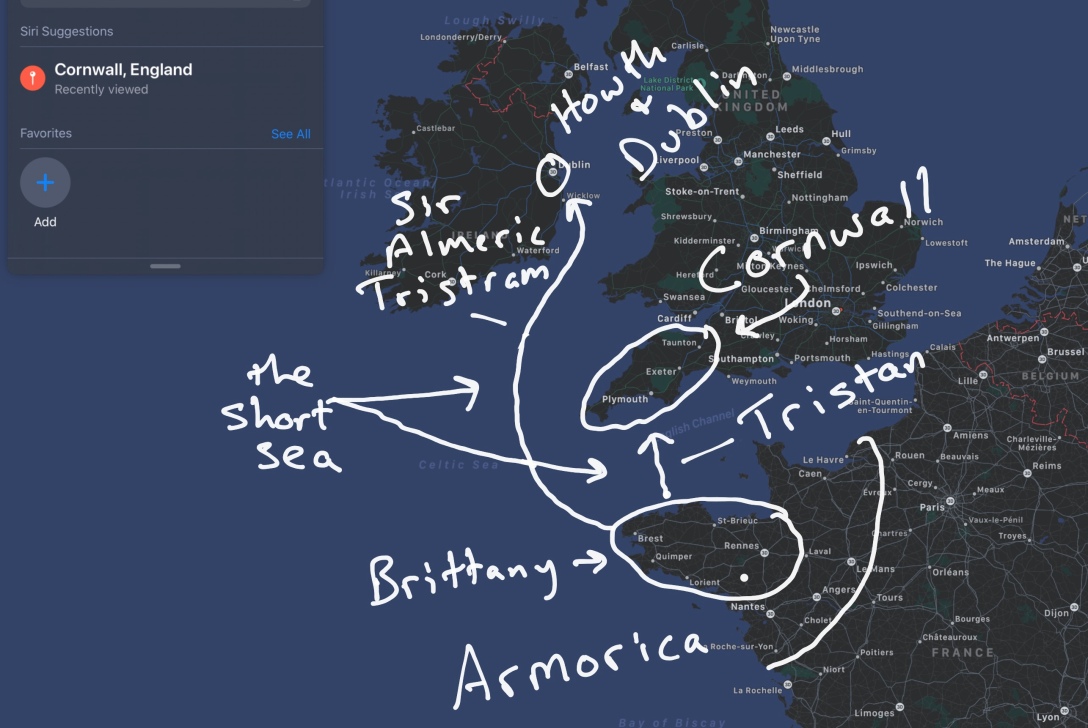
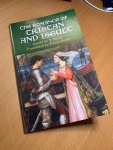
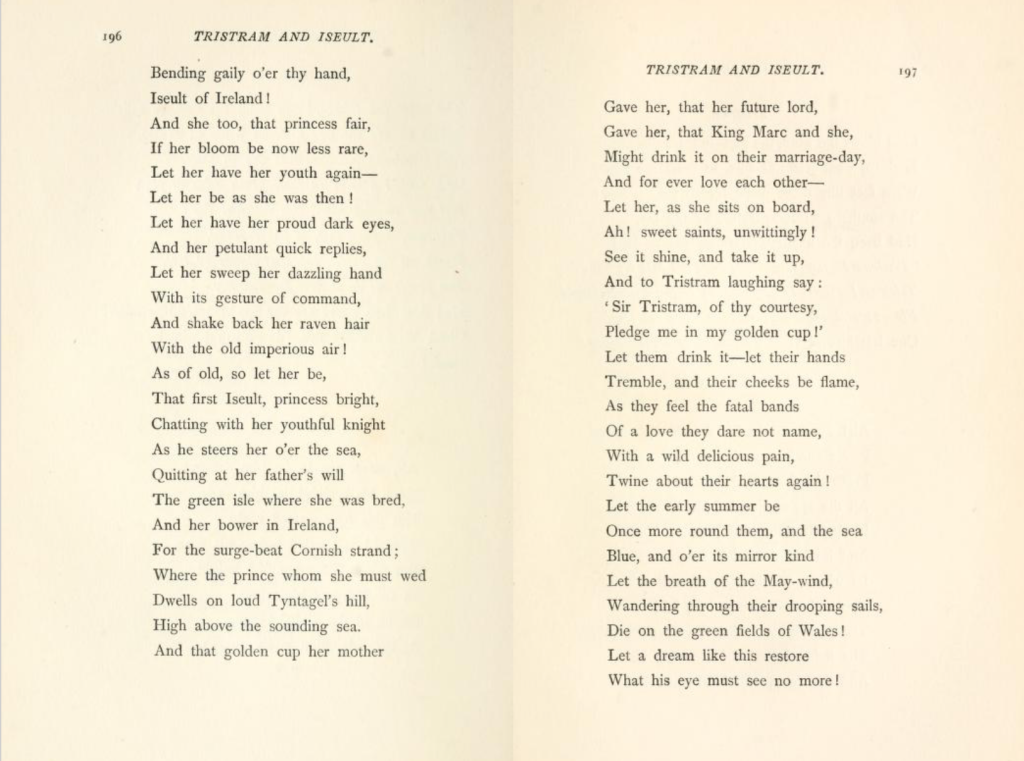
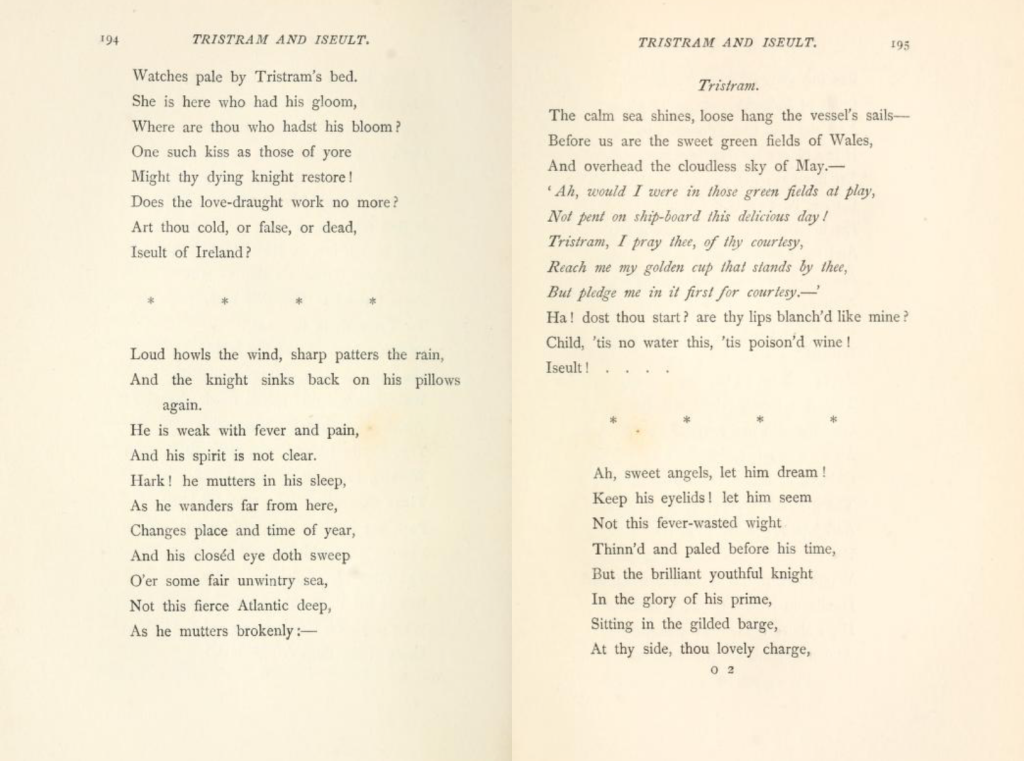
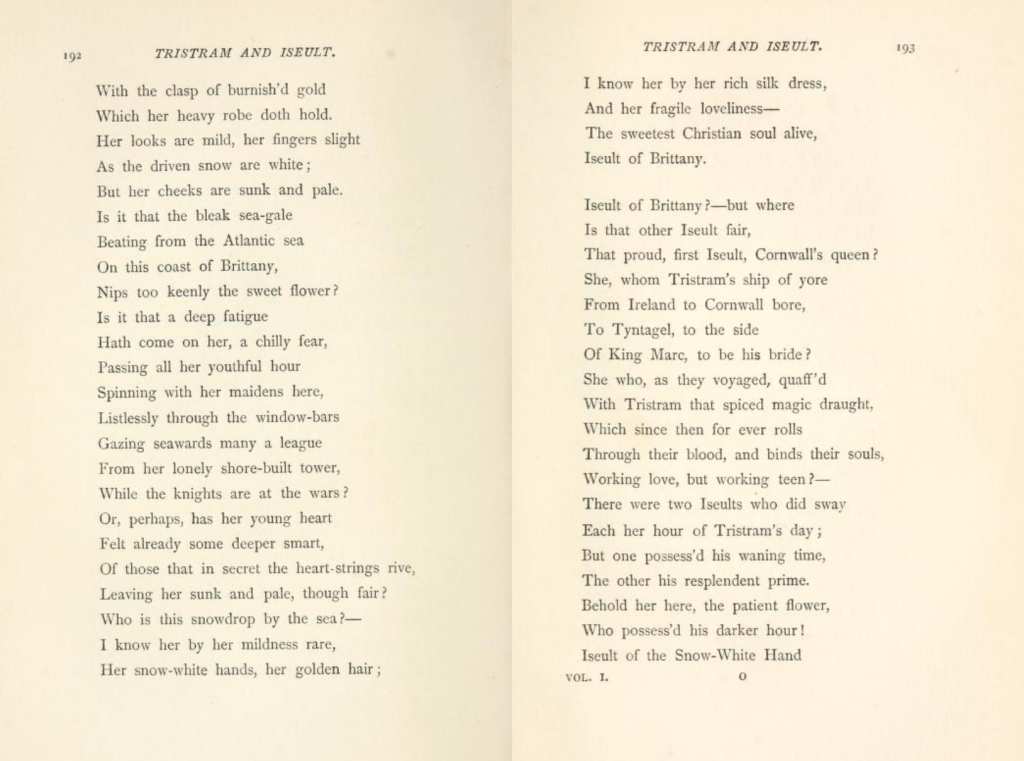
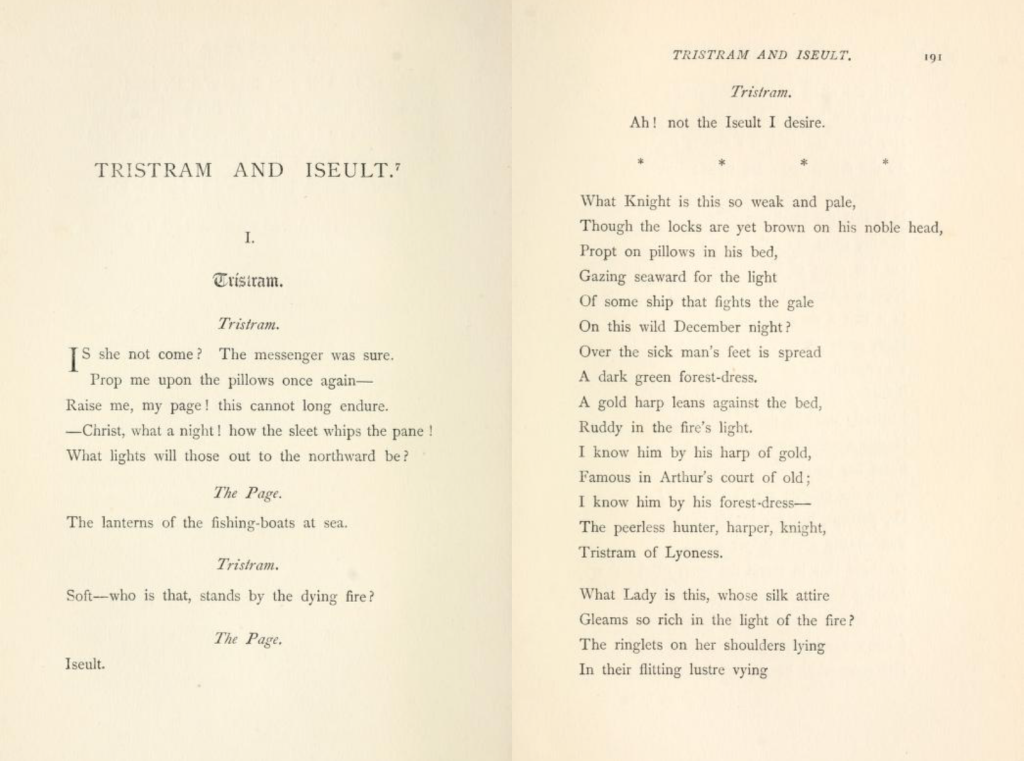
[…] if we momentarily forget the reference to Tristan and Iseult (from the year 1177) from the last post and assume “penisolate war” refers to the Peninsular War, we have a relatively consistent […]
LikeLike